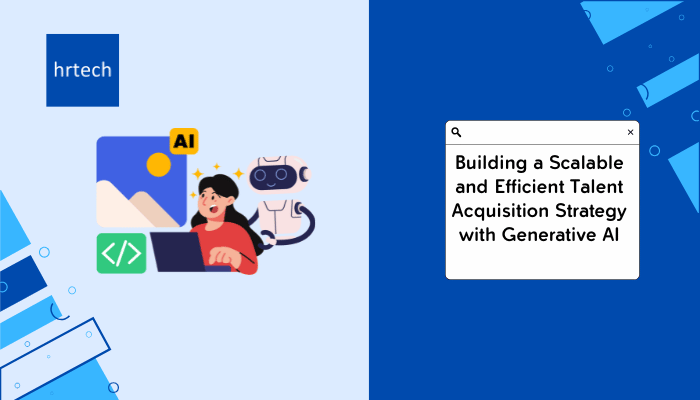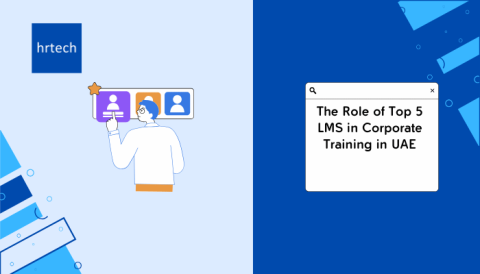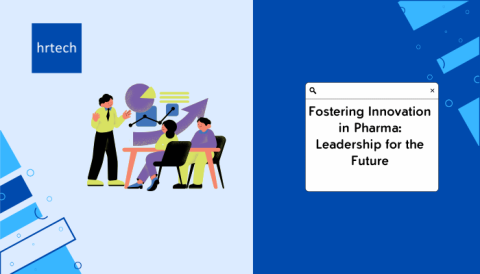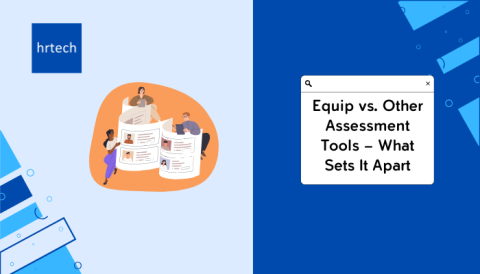The demand for top talent is overgrowing in the fast-paced world of recruitment, making traditional methods increasingly ineffective. With a competitive job market and ever-evolving candidate expectations, HR professionals and hiring managers use innovative solutions to streamline processes and attract the best candidates. By adopting these modern strategies for recruiting, HR teams can navigate today’s challenges more effectively, ensuring they secure top talent in an ever-evolving market.
This is where Generative AI in recruitment steps in. An advanced, game-changing technology that enables organizations to create scalable, efficient, and data-driven talent acquisition strategies. By leveraging the power of AI, recruitment teams can not only automate time-consuming tasks but also make more informed decisions, enhancing both the candidate experience and overall recruitment outcomes.
This blog explores how generative AI transforms recruitment, offering practical insights, ethical considerations, and compliance.
Overview of Talent Acquisition
Talent acquisition is identifying, attracting, and hiring skilled candidates to meet an organisation’s evolving needs. However, in today’s digital age, this process requires far more than just posting job openings and reviewing resumes. Companies increasingly compete for top talent, so recruitment strategies must be faster, more personalized, and data-driven.
According to Workday, Fortune 500 professional services firms saw a 30% increase in internal application rates via AI-driven notifications, a 19% increase in internal employees hired or in the process of being hired, and a 5% improvement in retention for employees who applied to jobs.
Role of Generative AI in Modern Recruitment
Generative AI revolutionises how organizations acquire talent, transforming traditional hiring processes into more efficient, data-driven, and personalized experiences.
Key Benefits of Generative AI in Modern Recruitment:
- Automated Content Creation: Generative AI can create job descriptions, personalized candidate outreach messages, and follow-up emails, saving time and ensuring consistency across recruitment communications.
- Predictive Analytics: With predictive analytics, past hiring trends and current candidate data are analyzed to predict which candidates are most likely to succeed in specific roles.
- Personalized Candidate Engagement: Using natural language processing (NLP), generative AI engages with candidates conversationally, fostering relationships even during the early stages of recruitment.
- Improved Candidate Experience: AI tools provide instant responses, schedule interviews, and offer timely updates, keeping candidates engaged throughout the hiring process.
- Cost Efficiency: Generative AI automates time-consuming tasks, allowing recruitment teams to focus on high-impact activities and reduce overall hiring costs.
Incorporating generative AI into recruitment strategies makes the hiring process faster and more accurate and creates a better experience for both candidates and recruiters.
Download the eBook: Building a Scalable and Efficient Talent Acquisition Strategy with Generative AI to dive deeper into how you can leverage AI in your hiring process.
Understanding Generative AI in Recruiting
Generative AI refers to artificial intelligence models capable of creating content, such as text, audio, or images, by learning patterns and structures from data. In the context of recruitment, generative AI goes beyond task automation by generating human-like interactions and personalized content.
According to the HR Executive, the HR workload is expected to rise by 7%, while cost reduction is a simultaneous focus.
Generative AI vs Traditional AI in Talent Acquisition
The table below highlights the differences between generative AI and traditional AI in recruitment, specifically focusing on their respective roles in talent acquisition:
| Feature | Generative AI | Traditional AI |
| Role in Recruitment | Creates content (e.g., job descriptions, candidate outreach) and engages in human-like interactions. | Automates specific tasks (e.g., resume screening, keyword matching). |
| Flexibility | Highly flexible and capable of adapting to tasks such as personalized candidate communication and dynamic screening. | More rigid and task-specific, typically designed to handle repetitive tasks. |
| Candidate Experience | Provides a personalized experience by tailoring messages, feedback, and communication-based on candidate behavior and responses. | Limited personalization, primarily focused on automated tasks like scheduling and shortlisting. |
| Automation Level | Automates complex workflows, including candidate sourcing, screening, and initial interviews. | Primarily automates simpler tasks such as resume filtering or matching keywords. |
| Learning and Adaptability | Learns from past data to improve over time, ensuring more accurate, context-aware interactions. | Operates based on pre-defined algorithms and static criteria, with limited learning capabilities. |
Key Benefits of Implementing Generative AI
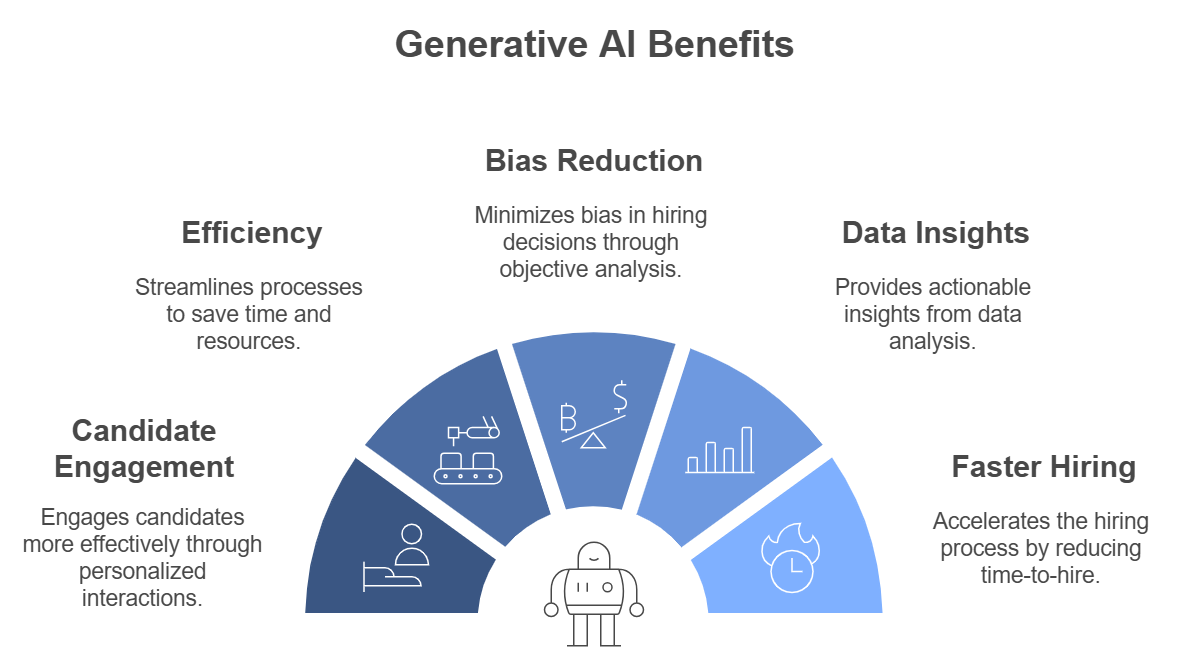
Implementing generative AI into your recruitment process offers several key benefits that can enhance the efficiency and scalability of your recruiting strategies.
- Enhanced Candidate Engagement: By delivering personalized messages and communications, generative AI improves the candidate experience, keeping them engaged throughout the recruitment process.
- Improved Efficiency: Automating tasks such as resume screening, job description creation, and candidate outreach frees up valuable time for recruiters to focus on high-level decision-making and relationship-building.
- Bias Reduction: Generative AI can be designed to evaluate candidates based on merit and qualifications, helping reduce unconscious bias in hiring decisions.
- Data-Driven Insights: AI-powered analytics provide real-time insights into recruitment performance, helping HR teams refine their strategies for recruiting and make more informed decisions.
- Faster Hiring: By automating candidate sourcing, screening, and communication, generative AI helps reduce time-to-hire, making the recruitment process faster and more efficient.
Developing a Scalable Talent Acquisition Framework with Gen AI
A scalable talent acquisition strategy is essential for businesses aiming to expand their workforce without compromising on hiring or candidate experience quality. Integrating generative AI into recruitment processes can significantly improve scalability, helping organizations handle large volumes of applicants while maintaining efficiency. .
Elements of a Scalable Recruitment Strategy
A scalable recruitment strategy can grow and adapt to the changing needs of the business. Key elements include:
- Automation of Routine Tasks: Using AI tools for resume screening, interview scheduling, and candidate communications.
- Integration of AI and Human Elements: Combining the efficiency of AI with the empathy and decision-making skills of human recruiters.
- Real-Time Data and Insights: Leveraging AI to gather insights into recruitment performance and trends, allowing for continuous improvement.
Integration of Generative AI Tools in Recruitment Processes
Generative AI tools can be integrated seamlessly into various stages of the recruitment process:
- Job Descriptions: AI can generate job descriptions tailored to the specific needs of the role and company culture.
- Candidate Sourcing: By analyzing data from job boards and social media platforms, AI can help identify potential candidates who might not be actively seeking jobs but are an excellent fit for the role.
- Video Interviews: AI-powered chatbots can conduct initial video interviews, evaluating candidate responses to questions and providing valuable insights to HR teams.
Designing AI-Powered Automated Workflows
To achieve scalability and efficiency, recruitment teams must design automated workflows integrating generative AI at every process stage. This includes automating candidate outreach, resume shortlisting, and interview scheduling. By reducing the administrative burden, recruiters can focus more on building relationships with top candidates.
Ready to transform your hiring process? Download our eBook on Building a Scalable and Efficient Talent Acquisition Strategy with Generative AI and learn how to harness the power of AI to streamline your recruitment workflows.
Enhancing Efficiency through Generative AI
Organizations increasingly use generative AI to streamline and enhance their recruitment processes in today’s fast-paced recruitment landscape. The power of AI lies not only in its ability to reduce the time spent on manual tasks but also in its capability to improve accuracy, boost candidate engagement, and provide data-driven insights.
Streamlining Candidate Sourcing with AI
Finding the right candidates can be time-consuming, but generative AI tools can help by automating candidate sourcing. AI can sift through resumes, analyze LinkedIn profiles, and even tap into niche job boards to identify candidates who meet the required qualifications.
Using AI for Resume Screening and Shortlisting
Generative AI can significantly speed up resume screening by automatically sorting through thousands of resumes and identifying the most relevant candidates.
- ATS with AI: AI-powered ATS systems analyze resumes based on specific job descriptions and criteria.
- Efficiency: AI reduces manual labor, saving time and resources during the screening process.
- Objective Screening: AI ensures a more unbiased, data-driven approach by ranking candidates based on qualifications, experience, and skills.
- Accuracy: Minimizes human error and enhances the likelihood of selecting the best-fit candidates for the role.
Automating Candidate Interaction and Communication
AI-powered chatbots can handle initial interactions with candidates, answering questions about job roles, company culture, and benefits. By automating this process, HR teams can provide a more responsive and efficient candidate experience, improving engagement and reducing dropout rates.
Data-Driven Decision-Making in Recruitment
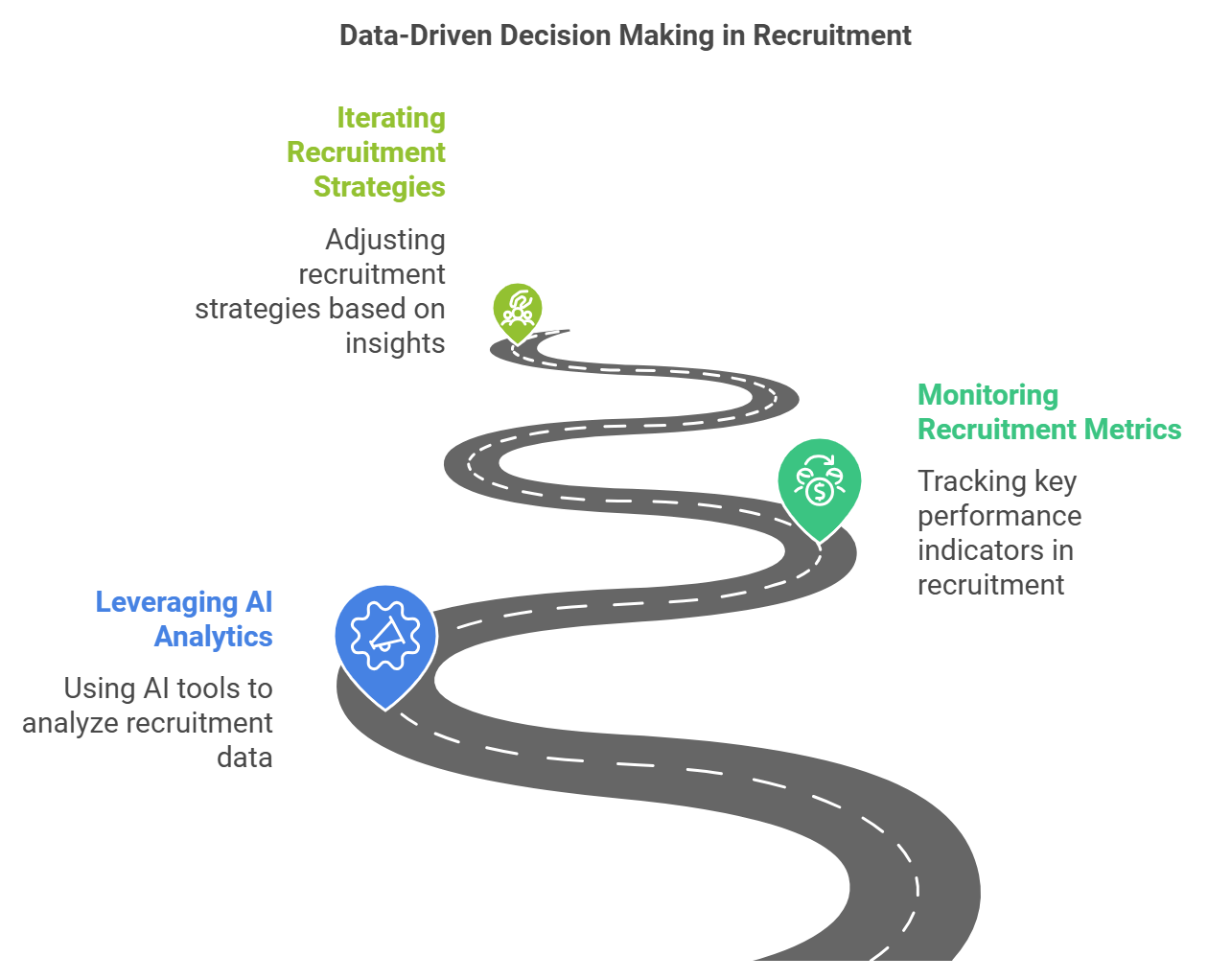
In today’s competitive talent landscape, data-driven decision-making is critical for recruitment teams looking to streamline their processes and improve hiring outcomes. Integrating generative AI into your recruiting strategies allows HR professionals to make smarter, more informed decisions by analyzing large volumes of data from various recruitment activities.
To learn more about how HR solutions can further enhance your recruitment efforts, check out our article on Staffing and HR Solutions Services, which delves into the tools and services that help optimize recruitment strategies and support long-term talent acquisition goals.
Leveraging AI Analytics for Better Hiring Decisions
One of the most powerful features of generative AI is its ability to analyze data to make informed decisions. AI can help HR teams assess candidate performance, predict long-term success, and identify potential red flags, resulting in more accurate hiring decisions.
Monitoring Recruitment Metrics and Performance
By using AI to track recruitment metrics such as time-to-hire, candidate quality, and sourcing effectiveness, HR teams can better understand what strategies are working and where improvements are needed. AI enables real-time adjustments, ensuring that recruitment strategies align with business objectives.
Iterating Recruitment Strategies Based on AI Insights
Generative AI is not a set-it-and-forget-it tool. HR teams can continuously refine and improve recruitment strategies by gathering data on candidate behaviour, interview performance, and hiring outcomes. This helps companies stay competitive by adapting their strategy based on the latest insights.
This data-driven approach allows HR teams to continually optimize their hiring processes, ensuring they attract and retain the best talent in a competitive landscape.
Now, let’s explore Ethical Considerations and Compliance and streamline the recruitment process even further.
Ethical Considerations and Compliance
As generative AI becomes increasingly integrated into strategies for recruiting, organizations must address the ethical implications of using AI in recruitment processes. It’s essential to develop a recruitment strategy that maximizes AI’s potential and adheres to ethical guidelines and compliance standards.
For more insights on balancing AI-driven recruitment with ethical considerations, check out our article on HR Employee Engagement Activities for Teams, where we explore the importance of building strong connections with employees to foster a positive work culture alongside technological advancements.
This section explores key ethical considerations in AI-driven recruitment and offers strategies for ensuring compliance, fairness, and transparency as you evolve your strategy for recruiting with AI technology.
Addressing Bias and Fairness in AI-Driven Recruitment
While AI-driven hiring solutions have the potential to reduce bias, they can also perpetuate it if not properly managed. Organizations need to ensure that the AI systems they implement are designed to promote fairness and inclusivity, providing equal opportunities for all candidates.
Ensuring Data Privacy and Compliance with Regulations
Data privacy is a major concern in any AI-driven recruitment strategy. Companies must ensure that candidate data is stored securely and comply with local regulations, such as GDPR, to protect the privacy of job seekers.
Balancing Automation with Human Oversight
Generative AI should not replace human recruiters but should work alongside them. Balancing automation with human oversight is crucial to ensure that the recruitment process remains empathetic, transparent, and fair.
Implementing a Generative AI Recruitment Strategy
Recruiting strategies are changing rapidly in today’s fast-paced talent landscape, with generative AI playing an increasingly important role.
This section will explore how to effectively implement a generative AI recruitment strategy, covering the steps to transition from traditional hiring methods, training HR teams, and measuring success to ensure AI integration delivers long-term value.
Steps to Transition from Traditional to AI-Enhanced Recruitment
Transitioning from traditional recruitment methods to AI-enhanced processes requires careful planning. HR teams should:
- Assess current workflows to identify areas where AI can add value.
- Select AI tools that align with organizational needs.
- Train HR teams on how to use AI tools effectively and ethically.
Training HR Teams for Effective AI Integration
For AI to be truly effective, HR teams must be trained on the technical aspects of AI tools and how to interpret AI insights and integrate them into their decision-making processes. Understanding how to optimize your hiring process with AI tools is essential for HR professionals to make better, data-driven decisions.
To dive deeper into the step-by-step selection process for hiring employees, check out our detailed guide on the Step Selection Process for Hiring Employees, where we explore key steps in the hiring journey and how AI can enhance recruitment efficiency.
Measuring Success and Continuous Improvement
Like any recruitment strategy, the success of an AI-enhanced process should be continuously evaluated. AI tools can help track key performance indicators (KPIs) such as time-to-fill, quality of hire, and candidate satisfaction, allowing HR teams to make data-driven improvements.
Conclusion
Generative AI offers immense potential in recruitment, providing companies with the tools to attract top talent, streamline processes, and make better, data-driven hiring decisions. However, it’s essential to recognise the ethical challenges and the need for human oversight.
As generative AI evolves, its impact on talent acquisition will only grow. By embracing this technology, companies can future-proof their recruitment strategies and ensure they are prepared for tomorrow’s hiring landscape challenges.
Transform your recruitment strategy today, download the eBook Building a Scalable and Efficient Talent Acquisition Strategy with Generative AI, and discover how you can leverage cutting-edge AI tools to build a talent pipeline that meets the demands of today’s competitive job market.
